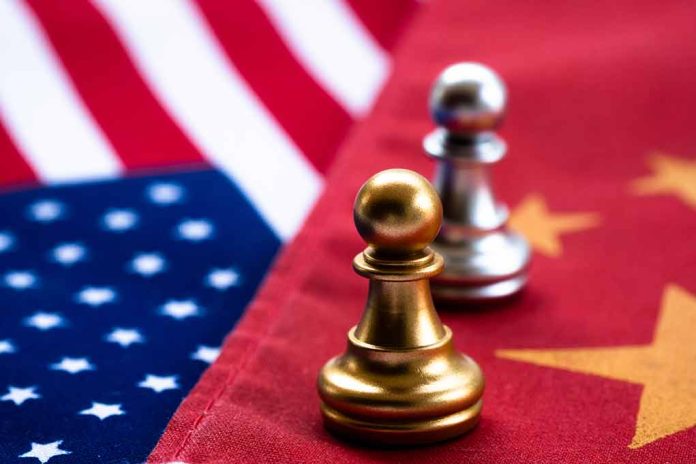
China has fired a warning shot at countries considering trade deals with the Trump administration, threatening retaliatory measures against nations that make agreements at China’s expense.
Top Takeaways
- China has explicitly warned it will take “countermeasures” against countries that make trade deals with the U.S. that harm Chinese interests
- The Trump administration has imposed tariffs up to 145% on Chinese imports while pausing tariffs for most other countries for 90 days
- Over 70 countries have reportedly initiated negotiations with the U.S., with around 130 nations expressing interest in new trade deals
- China has already retaliated with 125% tariffs on U.S. imports and is strengthening ties with other nations affected by U.S. tariffs
- The escalating trade war poses significant threats to global financial markets and economic stability
China’s Stark Warning to U.S. Trade Partners
The Chinese Commerce Ministry delivered an unambiguous message to countries considering trade agreements with the United States under the Trump administration. In a strongly worded statement, Chinese officials declared they would take decisive action against any nation making deals that undermine China’s economic interests. The warning comes as the Trump administration continues its aggressive trade policy against Beijing while simultaneously offering tariff exemptions to countries willing to limit their trade with China.
China’s Commerce Ministry spokesperson didn’t mince words, stating: “China firmly opposes any party reaching a deal at the expense of China’s interests. If this happens, China will never accept it and will resolutely take countermeasures in a reciprocal manner. China is determined and capable of safeguarding its own rights and interests.”
*CHINA WARNS COUNTRIES NOT TO CUT TRADE DEALS WITH U.S. THAT MAY HARM ITS INTERESTShttps://t.co/bzudQkp5UX
— Investing.com (@Investingcom) April 21, 2025
Escalating Tariff War
The Trump administration has implemented substantial tariffs on Chinese imports, with rates reaching as high as 145%. In a strategic move, Trump has paused tariffs for 90 days for all countries except China, creating leverage to pressure other nations into limiting their economic relationships with Beijing. This approach has reportedly attracted the interest of approximately 130 countries eager to negotiate new trade arrangements with Washington, with over 70 nations already initiating discussions following the tariff announcements.
Beijing has already responded with 125% tariffs on American imports and shows no signs of backing down. Chinese officials have labeled U.S. actions as “economic bullying” while continuing to build economic relationships with nations affected by American trade policies. President Xi Jinping has been actively engaging with Vietnam, Malaysia, Japan, South Korea, and the European Union to promote what China describes as “an open and cooperative international environment.”
Global Economic Implications
The intensifying trade war between the world’s two largest economies is causing significant disruptions in global financial markets. U.S. Treasury Secretary Scott Bessent has suggested that countries negotiating with Washington should “approach China as a group,” a strategy Beijing views as an attempt to isolate it economically. Meanwhile, China has cautioned the European Union against “appeasing” the United States.
While the Trump administration claims tariffs will boost consumption of American-made goods and increase domestic investments, critics argue this approach complicates the return of manufacturing to the United States. As diplomatic tensions escalate, China has indicated openness to talks with the U.S., though no formal meetings have been scheduled. Vice President JD Vance is expected to meet with India’s Prime Minister Narendra Modi, one of China’s largest economic adversaries, where the two are expected to discuss a bilateral trade deal.






















